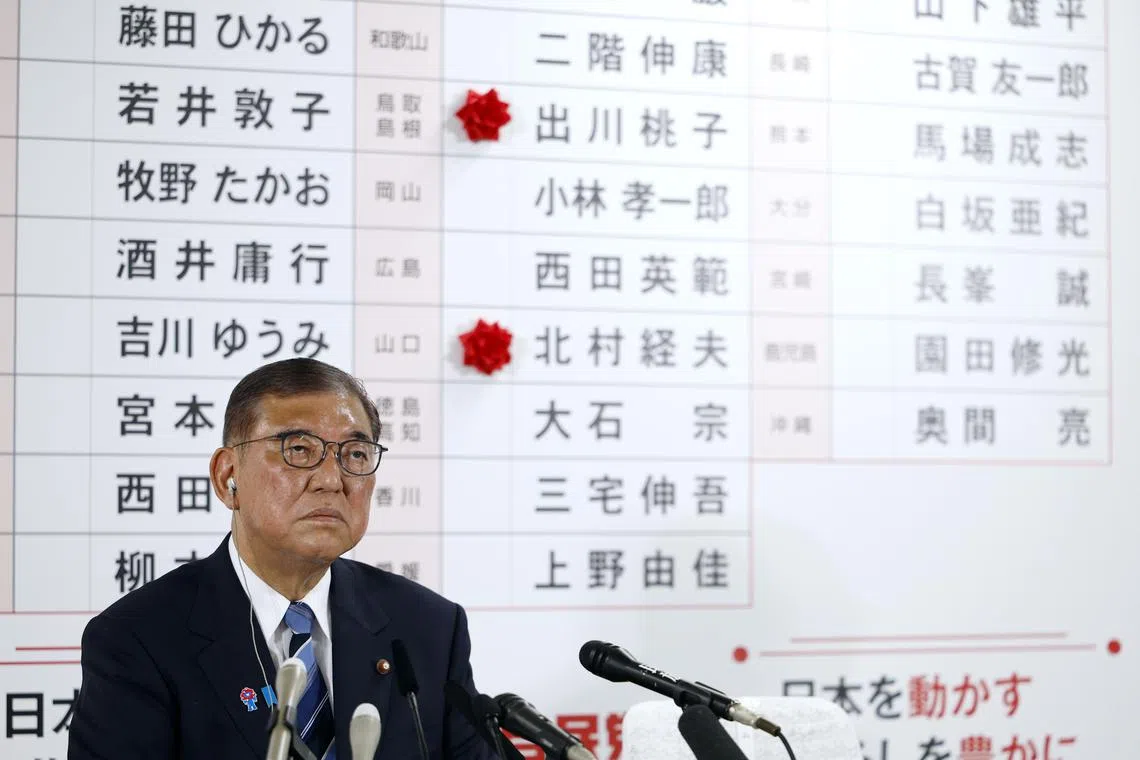Japan PM Ishiba under siege after ruling coalition loses Upper House majority
Sign up now: Get insights on Asia's fast-moving developments

Japanese Prime Minister Shigeru Ishiba at the ruling Liberal Democratic Party's headquarters in Tokyo after the Upper House election on July 20.
PHOTO: EPA
- The LDP and Komeito coalition lost their majority in Japan's Upper House election, winning only 47 of the 125 seats at stake, signalling a potential turning point in politics.
- The far-right Sanseito party gained significant ground by capitalising on anti-globalism sentiments, while the election outcome highlighted the population’s concerns over cost of living.
- Prime Minister Ishiba faces internal pressure to resign, but analysts suggest policy changes are more likely than a government collapse despite the coalition now holding a minority in both chambers.
AI generated
TOKYO – Besieged Japanese Prime Minister Shigeru Ishiba finds himself deeper in the political trenches after his ruling coalition was battered at the Upper House election on July 20, but has defiantly insisted he will not quit.
Results show his Liberal Democratic Party (LDP) and partner Komeito lost their majority in the chamber. The coalition won 47 seats – it needed 50 seats to maintain control in the Upper Chamber of Japan’s bicameral Parliament.
Far-right populist Sanseito party was among the best performers, winning 14 seats from its previous single seat.
Sanseito campaigned on a “Japanese First” slogan
Mr Ishiba remained headstrong despite calls from within his own party to quit.
“I believe that we should never forget our responsibility to the nation, and the responsibility we owe to having been given the seats as, comparatively, the largest party in the Diet (even without a majority),” he said on July 20. “We must, at all costs, avoid creating a political vacuum and making the confusion worse.”
On July 21, he apologised for the electoral defeat but again stressed the need for political continuity at a time of “national crisis” wrought by American ‘reciprocal’ tariffs, as well as geopolitical tensions.
“While I am keenly aware of the serious responsibility behind the electoral outcome, I believe I must continue to fulfil my responsibility to the nation and its people, while sincerely listening to the voices of voters to avoid political stagnation and drift,” he told a news conference.
With his chief tariff negotiator Ryosei Akazawa en route to Washington for the eighth round of ministerial talks, Mr Ishiba reiterated that Japan will “protect our national interests as a fundamental principle”.
Upper House lawmakers serve fixed six-year terms, with an election held every three years for half of the 248-seat Chamber. The LDP and Komeito have 75 seats not up for re-election.
There were 125 seats at stake in the election, including one vacancy. Voter turnout was 58.51 per cent, the Internal Affairs Ministry said on July 21, which marks an increase of 6.46 percentage points from 2022.
Experts told The Straits Times that while the prime minister is not selected from the Upper House and the polls will not directly bring down the government, the election could nonetheless mark a pivotal turning point in Japanese politics.
For one thing, it starkly exposed how xenophobic comments – even as Sanseito insists it is not “anti-foreigner” but “anti-globalism” – strike a raw nerve and can sway voters, political scientist Toru Yoshida of Doshisha University said.
Sanseito’s momentum going into the election had put the LDP on the back foot, with the government on July 15 launching a cross-agency “control tower” to deal with foreigner issues.
Dr Mikitaka Masuyama of the National Graduate Institute for Policy Studies, meanwhile, said he was concerned that the election could foreshadow more strident anti-establishment voices in future polls, empowered by the weaponising of social media to appeal to voters.
More significantly, the experts said, Japanese politics is now in uncharted territory, with the LDP-Komeito coalition having already lost its majority in the Lower House in an October 2024 election.
Never before has the ruling government commanded only a minority in both Chambers of the Diet, a situation that will drastically complicate policymaking as the coalition lacks the necessary numbers to pass legislation.
One potential path forward, Dr Masuyama suggested, is for the LDP-Komeito to try to expand its coalition by bringing in other conservative-aligned parties into the fold. Alternatively, the coalition could conduct horse-trading by collaborating on an ad hoc policy basis.
Senior leaders in key opposition parties have already ruled out formally joining the ruling coalition.
But Sanseito leader Sohei Kamiya told reporters on July 20 that he was open to working with the LDP on individual policies.
The election had been largely fought on the escalating cost-of-living crisis, with the outcome suggestive of how Mr Ishiba had failed to address bread-and-butter concerns.
Inflation has remained stubbornly high, climbing 3.3 per cent in June from a year earlier. And households feel poorer, with real wages dropping 2.9 per cent in May from the previous year.
While the ruling coalition proposed cash handouts, the opposition has advocated at least a temporary cut to the consumption tax
Yet these dire economic conditions, exacerbated by the weak yen, have fuelled anti-foreigner sentiment.
As foreigners come to see Japan as “too cheap”, they are snapping up real estate while the country suffers the throes of overtourism.
In Tokyo, where there are seven seats, Sanseito candidate Saya, a former jazz singer who goes by one name, won her seat.
This was despite having drawn controversy during the hustings for an interview with Russian state media Sputnik TV, which sparked allegations of foreign election interference
Besides staunchly backing the “Japanese First” platform, Ms Saya, 43, raised eyebrows for advocating that Japan arms itself with nuclear weapons
The LDP represents a broad church of political views, and the dismal showing has Mr Ishiba’s rivals within the party baying for blood.
Public broadcaster NHK quoted an unnamed former Cabinet minister as saying that no LDP leader has ever continued in power after losing consecutive elections, and Mr Ishiba should resign and take responsibility.
Defeats in the Upper House have, in recent history, brought down the administrations of Mr Sosuke Uno in 1989 and Mr Ryutaro Hashimoto in 1998.
On July 18, former economic security minister Sanae Takaichi, a hardline conservative rival who was runner-up to Mr Ishiba during the 2024 LDP presidential polls, openly declared her intention to lead the LDP – and Japan.
“The LDP needs a new backbone once again, and I have made up my mind to fight to achieve that,” she stated.
Nevertheless, Japan is not due for another national election until 2028, while an LDP presidential election is only scheduled for September 2027, unless Mr Ishiba resigns prematurely.
All eyes will be on what Mr Ishiba says at a press conference slated for 2pm (1pm Singapore time) on July 21.
Despite the uncertainties, Dr Yoshida does not anticipate major upheavals in the Japanese political climate, especially given ongoing geopolitical and trade uncertainties, such as American “reciprocal” tariffs
“The situation will likely be the same as it was after (2024’s) Lower House election,” he observed.
“Different opposition parties will try to force the ruling coalition to accept and take on board their party policies, and the LDP will create ‘diagonal’ partnerships each time for the expediency of passing legislation.”
While the opposition remains fragmented, he noted: “If they get organised, there is a scenario where they can submit a no-confidence motion to topple the government.”



